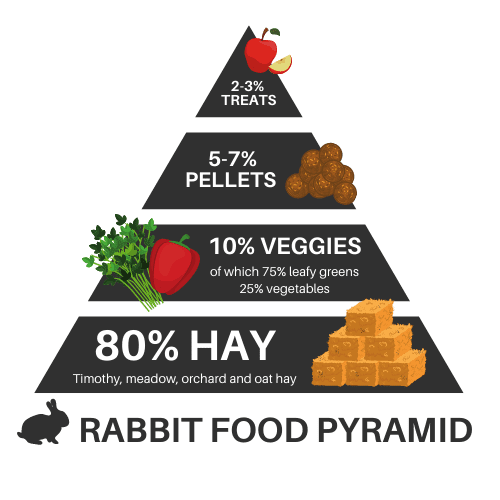
Do you own a rabbit? Or are simply interested in what rabbits can and cannot eat. You may have wondered whether they could eat bread. You might be concerned about feeding your pet a piece of bread since it is a common household staple. We will explore the topic in detail in this article. It will also provide you with all the knowledge you need about feeding bread to rabbits.
Understanding a Rabbit’s Diet
It’s important to understand rabbits’ nutritional requirements. This will help before delving further into the specific question of bread. Rabbits often consume hay, grass, vegetables, and leafy greens in their natural environment. Their digestive system naturally processes fibrous vegetation quickly. A balance of fiber, nutrients, and gut flora supports a rabbit’s digestive system. A high-fiber diet is essential for their general health. It aids in the prevention of digestive and dental issues. To ensure rabbits’ well-being, feed them according to their natural feeding preferences.
Nutritional Aspects of Bread
Knowing bread’s nutritional profile is crucial to figuring out if rabbits can eat it. Bread ingredients are mainly flour, yeast, water, and salt. Sometimes, extra ingredients like sugar or oil are needed. Examining these components in detail will help us determine how they impact a rabbit’s diet.
- Flour: To make flour, a vital component of bread, grains such as wheat, rye, or barley are ground. Rabbits are herbivores and can consume plant-based diets. Their gastrointestinal systems are built to break down high-fiber foods. Flour lacks the necessary fiber content and does not align with a rabbit’s dietary needs.
- Yeast: Yeast handles the fermentation process in bread-making. It is not a suitable ingredient for rabbits. Why? Because it can disrupt their delicate digestive balance. Can also cause digestive issues such as gas or bloating.
- Salt: Bread often contains salt for flavoring. Small amounts of salt are generally safe for rabbits. But too much of it results in Dehydration or electrolyte imbalances. It is best to avoid feeding rabbits bread that contains excessive salt content.
- Additives: Some bread varieties may include additives like sugar or oil. These additives are not beneficial for rabbits. They can lead to weight gain, dental issues, or digestive problems.
Bread and Rabbits: The Basics
Now let’s address the question at hand: Can rabbits eat bread? Although bread is not poisonous to rabbits, avoid feeding it to them frequently. It’s important to understand the basics of bread and its impact on rabbits’ health.
Lack of Nutritional Value: Bread lacks the necessary nutrients that rabbits need. It is primarily made from refined wheat flour. It is deficient in protein, fiber, and important vitamins and minerals. Rabbits need a diet rich in fiber and nutrients to maintain optimal health. Bread falls short of meeting these requirements.
Digestive Concerns: Rabbits have sensitive digestive systems. Introducing foods that are not part of their natural diet can lead to digestive upset. Bread is high in carbohydrates. It can disrupt the delicate balance of a rabbit’s digestive flora. and potentially cause issues such as diarrhea or bloating.
Weight Gain and Obesity: Bread is relatively calorie-dense. It can contribute to weight gain if consumed in large quantities. Obesity in rabbits can lead to joint issues. It increases the risk of cardiovascular disease. It is important to watch their weight and ensure they maintain a healthy body condition. Different types of bread may contain additives that are not beneficial for rabbits. It can lead to weight gain, dental issues, or digestive problems.
Dental Issues: Rabbits’ teeth grow continuously throughout their lives. Lack of proper dental wear can lead to dental problems. Bread’s soft texture does not provide the chewing action required for maintaining healthy teeth. It can contribute to overgrowth or malocclusion.
Avoid feeding bread to rabbits as a regular part of their diet. Consider switching to a diet high in fiber that includes fresh hay, leafy greens, vegetables, and herbs.
Can Rabbits Eat Bread?
While bread may not be toxic to rabbits, it does pose certain risks, so approach it with caution. Here are some potential risks associated with feeding bread to rabbits:
- Digestive Upset: As mentioned earlier, the carbohydrate content in bread can disrupt a rabbit’s digestive system. Leading to issues like diarrhea, gas, or bloating. Rabbits have a delicate balance of gut flora. Sudden changes in their diet can upset this balance. It can cause discomfort and potential health complications.
- Dental Problems: Rabbits have continuously growing teeth. Their diet should include fibrous foods that help wear down their teeth naturally. Bread is soft and lacks the fibrous texture necessary for maintaining proper dental health. Feeding rabbits bread regularly can contribute to overgrown teeth, malocclusion, and related complications.
- Nutritional Imbalances: Feeding bread as a major part of a rabbit’s diet leads to nutritional imbalances. Essential nutrients like fiber, vitamins, and minerals are insufficient in bread. These are crucial for a rabbit’s well-being. Relying on bread instead of a diverse and balanced diet can lead to deficiencies. and related health problems
Healthy Alternatives to Bread
Here are some safe and nutritious alternatives to consider:
- Hay: Hay is an essential component of a rabbit’s diet. It provides the necessary fiber for healthy digestion. It wears down teeth and promotes general well-being. Provide your rabbit with a constant supply of fresh, high-quality hay, such as timothy hay or orchard grass.
- Leafy Greens: Leafy greens are a great addition to a rabbit’s diet. In addition to crucial vitamins and minerals. They offer a lot of fiber, low calories, and nutrition. Serve a variety of greens like cilantro, kale, parsley, and romaine lettuce. Introduce new greens gradually to avoid digestive upset.
- Vegetables: Alongside leafy greens, rabbits can also enjoy a range of vegetables. Opt for rabbit-friendly options like bell peppers, carrots, zucchini, and broccoli. Remember to introduce new vegetables slowly and watch your rabbit’s response.
- Herbs: Fresh herbs can provide both variety and nutritional benefits. Rabbits enjoy herbs like basil, dill, mint, and cilantro. Adding small amounts of herbs to their diet can enhance their foraging experience. It can also add flavor to their meals.
- Pellets: High-quality rabbit pellets can be a convenient way to provide balanced nutrition. Look for pellets that contain a high percentage of fiber, around 18–20%, and a low amount of added sugars. Pellets should complement a diet rich in hay and fresh vegetables rather than be the main component of their meals.
Other Considerations for the Rabbit’s Diet
Regarding a rabbit’s nutrition, there are some other vital factors to consider. Let’s explore these aspects in more detail. Let’s explore these aspects in more detail:
- Water Intake: Water is essential for rabbits, just like for any other living being. A constant supply of fresh, clean water for your rabbit is essential. Hydration is vital for proper digestion, temperature regulation, and general organ function. Use a water bottle or a heavy ceramic bowl to provide water, and make sure to check and refill it regularly.
- Moderation and Portion Control: It’s vital to practice moderation and portion control. Overfeeding a rabbit can result in obesity and other health issues. This is because they have particular dietary needs. Keep an eye on your rabbit’s weight and change portion sizes as necessary. Seek advice from a veterinarian if you’re unsure of how much food is ideal for your particular rabbit.
Introduction of New Diets

When introducing new foods to your rabbit’s diet, it’s crucial to do so gradually. Rapid changes in diet can cause digestive upset. It can potentially harm your rabbit’s delicate digestive system. Introduce new foods one at a time, in small amounts, and observe how your rabbit reacts. If there are any signs of digestive distress, such as soft stools or a decrease in appetite, exclude the new food from their diet. See a veterinarian for professional suggestions.
Avoid Harmful Foods
Besides bread, avoid other foods when it comes to feeding rabbits. These are some examples of foods that are bad for rabbits:
- Chocolate: Theobromine in chocolate, is harmful to rabbits (as well as other pets). It can cause cardiac issues, stomach disturbances, or even death.
- Sugary Foods: Rabbits have sensitive digestive systems. Their systems are not designed to process sugary foods. Sugary foods can cause weight gain, dental issues, and digestive problems. Avoid giving your rabbit sweets, cookies, or other sugary treats.
- Processed Foods: Processed human foods, such as chips, crackers, or fast food, are not suitable for rabbits. These foods frequently include large amounts of fat, salt, and preservatives. Their health may be harmed by them.
- Dairy Products: Rabbits are lactose intolerant and cannot digest dairy products properly. Milk, cheese, and other dairy items can lead to gastrointestinal problems. Avoid them.
Consult a veterinarian
Every rabbit is different. Their dietary needs may differ based on their age, weight, health, and level of activity. Always seek advice from a veterinarian with experience treating small animals or exotic pets. They can address any dietary concerns you might have. Offer personalized advice and suggest specific dietary recommendations.
Can Rabbits Eat Bread – Final Thoughts
To ensure the health and well-being of your rabbits, provide them a balanced, healthy food. Bread lacks essential nutrients for your rabbits. It can cause digestive problems among other health issues, even though it may not be toxic. Concentrate on providing a diet like premium hay, fresh leafy greens, vegetables, herbs, and suitable pellets. Don’t forget to offer fresh water and exercise restraint. Introduce new foods gradually and steer clear of unhealthy foods. Seek professional advice when necessary. Prioritizing your rabbit’s nutritional requirements will help you keep them happy. They’ll carry on leading a long, active, and healthy life.